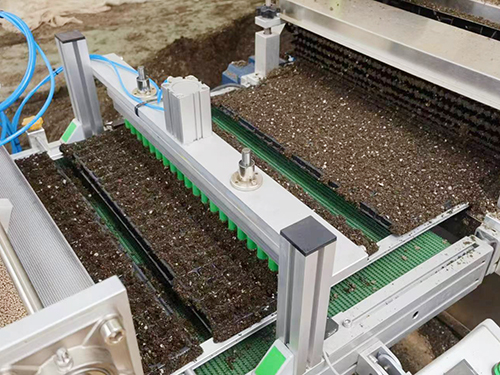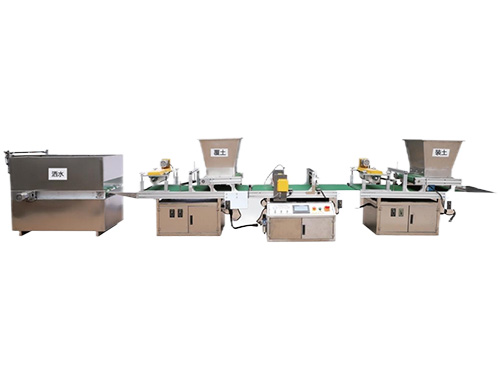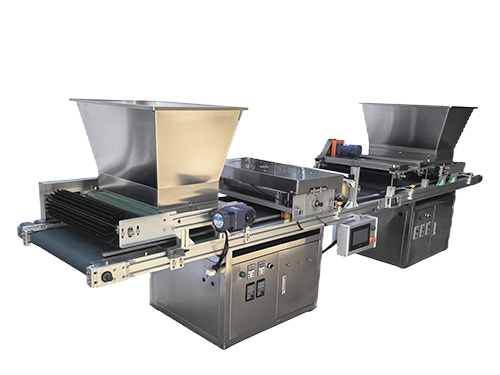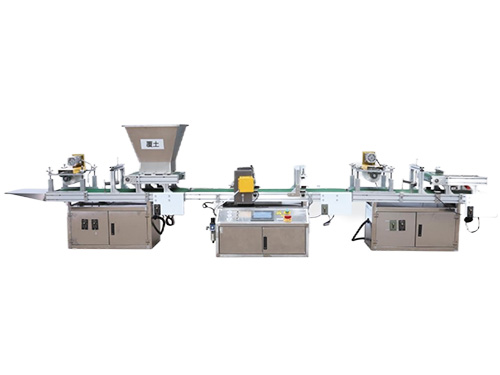Working Principle and Operation Guide of Seedling Tray Seeder
2024-08-31 11:25:34
In modern agriculture and horticulture, have become essential tools for enhancing seeding efficiency and planting quality. Whether for commercial farming or home gardening, understanding the working principle and operation of seedling tray seeders can help you achieve more efficient and precise seeding. This guide will explain the working principle of seedling tray seeders and provide operational instructions to help you make the most of this tool.

1. Working Principle of Seedling Tray Seeders
1.1. Seeder Structure
A seedling tray seeder mainly consists of a seeding mechanism, seed supply system, conveying system, and control system. The seeding mechanism places seeds evenly in the seedling tray. The seed supply system ensures a continuous seed supply. The conveying system transports the seeding trays to the designated location, while the control system adjusts various operational parameters of the seeder.
1.2. Seeding Process
Seed Supply System: The seeder extracts seeds from the seed hopper through the seed supply system. Seeds are transported to the seeding mechanism via vibration or air flow, ensuring even distribution.
Seeding Mechanism: The seeding mechanism typically features multiple rows of seeding heads that place seeds accurately in each cell of the seedling tray. The design of the seeding heads can be adjusted based on seed size and type to ensure effective seeding.
Conveying System: The conveying system moves the seedling trays to the next stage, such as covering with soil or cultivation. The stability and speed of the system significantly impact the uniformity and efficiency of seeding.
Control System: The control system allows users to set parameters like seeding density, spacing, and other settings to meet specific seeding needs. Intelligent controls enable the seeder to automatically adjust parameters, enhancing seeding precision and efficiency.
1.3. Seeding Accuracy
The seeder ensures even distribution of seeds in the seedling trays through precise seed supply and seeding mechanism design. Proper seeding density and spacing can improve seed germination rates and plant growth quality.
2. Operation Guide for Seedling Tray Seeders
2.1. Preparation
Inspect Equipment: Before use, check all components for proper function, including the seed supply system, seeding mechanism, conveying system, and control system. Ensure the equipment is clean and undamaged.
Adjust Settings: Adjust the seeder’s parameters according to the type of seed and the specifications of the seedling trays, such as seeding density, spacing, and seed supply. Make adjustments based on seed size and seeding needs.
Fill Seeds: Evenly fill the seed supply system with the required seeds. Ensure the seeds are clean and dry to avoid affecting the seeding outcome.
2.2. Operation Steps
Start Seeder: Turn on the seeder according to the equipment manual. Ensure all systems, including seed supply, seeding, and conveying systems, are functioning correctly.
Set Seeding Mode: Use the control system to select the appropriate seeding mode and parameters. Set seeding density, spacing, and other parameters to meet actual seeding needs.
Perform Seeding: Place the seedling trays in the seeder’s working area, ensuring accurate positioning. The seeder will automatically perform the seeding operation, ensuring even seed distribution in the trays.
Monitor Operation: Monitor the seeder’s operation in real-time during seeding. Check the seeding results to ensure even distribution and avoid missed or double-seeding.
Complete Seeding: After seeding, remove the seedling trays and proceed with subsequent processing, such as covering with soil or moistening. Clean the seeder to ensure long-term proper functioning.
2.3. Maintenance and Care
Regular Cleaning: Regularly clean all parts of the seeder, including the seed supply system and seeding mechanism. Remove residual seeds and debris to maintain equipment efficiency.
Check for Wear: Periodically inspect the seeder for wear, especially on the seeding heads and conveying system components. Replace damaged parts promptly to ensure stable operation.
Maintain Records: Keep records of the equipment’s usage and maintenance. Regularly check the equipment’s condition and make necessary adjustments and repairs.
3. Advantages of Seedling Tray Seeders
3.1. Increased Seeding Efficiency
Seedling tray seeders can complete large seeding tasks in a short time, significantly increasing seeding efficiency. Compared to manual seeding, seeders save time and labor, enhancing production efficiency.
3.2. Ensured Even Seeding
Seeders provide precise seeding mechanisms to ensure even distribution of seeds in seedling trays. This uniformity improves seed germination rates and plant growth quality.
3.3. Reduced Human Error
Using a seeder reduces human error, ensuring consistent and stable seeding. Automated operations minimize seeding issues caused by improper handling.
3.4. Enhanced Production Capacity
The efficient operation of seeders boosts overall production capacity, making them suitable for large-scale commercial farming and horticultural projects. By improving seeding precision and efficiency, they help achieve higher yields and better-quality crops.
Conclusion
Seedling tray seeders, with their efficient and precise seeding capabilities, are indispensable tools in modern agriculture and horticulture. Understanding their working principles and operation methods will help you leverage the seeder’s advantages to improve seeding efficiency and plant quality. Proper setup and operation according to your specific needs will support achieving successful planting goals.

The CNC Seed Braiding Machine is a high-precision, fully automated agricultural equipment s...

It adopts electrical integration and can be started by pressing the fully automatic button ...

The XP750 seeder has stable performance, excellent product quality, simple and convenient o...

It adopts electrical integration and can be started by pressing the fully automatic button ...



